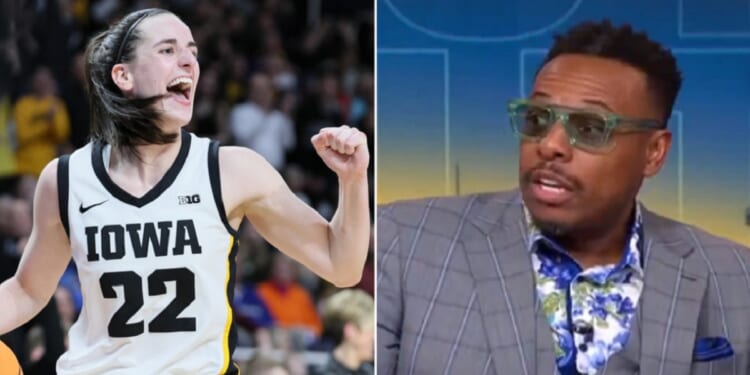When it comes to joking about skin color, basketball culture seems to have its own set of rules. Or at least it once did.
Nowadays, of course, race-mongers have turned skin color into the ultimate grift, calling out racism where it does not exist and demanding slavery reparations for an injury no living person has ever sustained, inflicted by generations long dead.
So we all feel exhausted and could use less commentary on meaningless physical differences, even in a historically benign context.
In the wake of Iowa Hawkeyes superstar guard Caitlin Clark’s dominant performance on Monday night, leading her team to a 94-87 victory over the defending champion LSU Tigers in the women’s NCAA basketball tournament, NBA legend Paul Pierce expressed surprise at seeing a “white girl in Iowa do it to a bunch of black girls.”
Pierce made those comments Tuesday on FS1’s “Undisputed” with Skip Bayless and Keyshawn Johnson.
Trending:
“That made it like, ‘Oh, that gained my respect,’” Pierce added. “That gained my respect.”
Bayless, who is white, endorsed Pierce’s comment.
“I hear you. You’re right,” Bayless said.
Pierce continued, no doubt intending a compliment to Clark, albeit in a basketball-culture context.
Was this race reference offensive?
“That’s like, ‘Oh, she didn’t do this to some other little white girls that was over here in Colorado or wherever,’” Pierce said, fumbling over his words. “She did it to some girls from LSU that we thought was some dawgs.”
“Defending champs,” Bayless interjected.
“Defending champs, and put ’em on her knee, and spanked them,” Pierce said.
Readers may view a 38-second clip of Pierce’s comments below.
Paul Pierce on Caitlin Clark;
“We saw a white girl in Iowa do it to a bunch of Black girls. That gained my respect…I didn’t expect that.”
lol 🤦♂️ pic.twitter.com/zjdGfKsVl4
— Savage (@SavageSports_) April 2, 2024
Clark dished out 12 assists and scored 41 points, including nine 3-pointers, to help the Hawkeyes exact revenge for last season’s loss to LSU in the national championship game.
Top-seeded Iowa advanced to the women’s Final Four on Friday. They will face traditional power and third-seeded Connecticut in a national semifinal game.
As a matter of curiosity and remarkable symmetry, all four regional finals in the women’s tournament featured a No. 1 seed vs. a No. 3 seed. And the same will hold true this coming weekend. In fact, the other national semifinal game will pit top-seeded South Carolina against third-seeded North Carolina State.
Legendary coach Geno Auriemma has already tried to downplay the fact that he did not recruit Clark to Connecticut despite her desire to play there.
“I hope Caitlin Clark had a personal agenda against LSU,” Auriemma joked once the match-up with Iowa was set.
Meanwhile, LSU coach Kim Mulkey called Clark a “generational player.”
LSU’s “dawgs” included star forward Angel Reese, who did her best to keep the Tigers close on Monday night. Reese finished the game with 17 points and 20 rebounds.
In Pierce’s defense, basketball culture has always included jocular, unapologetic and largely harmless references to skin color.
Wesley Snipes and Woody Harrelson, for instance, starred in a 1992 hit movie called “White Men Can’t Jump.” I graduated from high school that year and, as a white man, did not take offense to a statement I found both generally accurate and personally applicable.
Likewise, NBA legend Larry Bird, who is white, reportedly resented when other teams used white players to defend against him. He took it as a sign of disrespect.
Above all, no one got angry about it or pretended that they occupied a position of moral superiority. The overwhelming majority of players in the NBA and top college programs were black. Everyone noticed, and many commented on it, but few really cared.
In fact, had anyone ever told me that on the basketball court I resembled a black player (spoiler: no one ever did), I would have understood the meaning and taken it as a high compliment.
Pierce, who entered the Naismith Memorial Basketball Hall of Fame in 2021, grew up in that same era.
In 19 NBA seasons, 15 of them with the Boston Celtics, Pierce made the All-Star Game 10 times. He also led the Celtics to the 2007-08 NBA championship, winning Finals MVP.
In other words, Pierce’s talent and accomplishments spoke for themselves. And so do Clark’s. Merit means everything, skin color nothing.
Now, however, thanks to the grifting race-mongers, the way we talk about such things has changed.
In 1992, we talked about skin color, but it meant nothing. Today, it still means nothing, but the race-mongers tell us it means everything, so we do not talk about it as we once did.
Considering today’s environment, Pierce — whose nickname on the court was “The Truth” — probably should have left the subject alone, even if we all knew what he meant.
That does not strike me as a change for the better.













